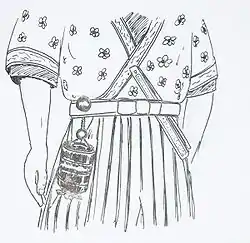提げ物
Japanese
| Kanji in this term | |
|---|---|
| 提 | 物 |
| さ(げ) Grade: 5 |
もの Grade: 3 |
| kun’yomi | |
| Alternative spelling |
|---|
| 提物 |
Etymology
Compound of 提げ (sage, “hanging”, the 連用形 (ren'yōkei, “stem or continuative form”) of verb 提げる sageru “to hang something”) + 物 (mono, “thing”).[1]
Pronunciation
Noun
提げ物 • (sagemono)
Descendants
- → English: sagemono
References
- Shōgaku Tosho (1988) 国語大辞典(新装版) [Unabridged Dictionary of Japanese (Revised Edition)] (in Japanese), Tōkyō: Shogakukan, →ISBN
- Matsumura, Akira, editor (2006), 大辞林 [Daijirin] (in Japanese), Third edition, Tōkyō: Sanseidō, →ISBN
- NHK Broadcasting Culture Research Institute, editor (1998), NHK日本語発音アクセント辞典 [NHK Japanese Pronunciation Accent Dictionary] (in Japanese), Tōkyō: NHK Publishing, →ISBN
This article is issued from Wiktionary. The text is licensed under Creative Commons - Attribution - Sharealike. Additional terms may apply for the media files.
